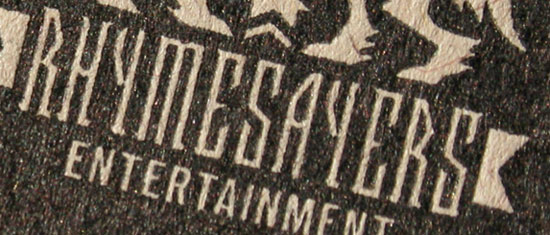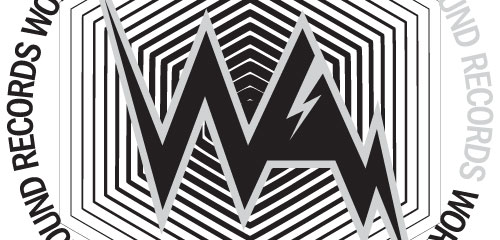DIY Hip Hop Business Master Class, Volume 2
Posted by Justin Boland on Aug 03, 2009 | 0 Comments

This is the second round of the Audible Hype “Greatest Hits” collection-the best advice, the most useful insights, the meaty details, gathered from veterans and experts and living legends. This installement is focused on the people working behind the scenes, and the mundane shitwork that make the music business actually work.
Rhymesayers Boot Camp 101

Source: Pulse of the Twin Cities
“We bring our artists through the quote-unquote Rhymesayers Boot Camps,” explains Bird, who’s had some experience as a drill sergeant. “Atmosphere’s the flagship artist: Sean [Slug] has been doing this longer than any of them and has built Atmosphere to the point, touring-wise, that they can sell out bigger rooms. So he’ll bring [Brother] Ali out on the Godlovesugly tour when he’s never been out there before. It’s up to the artist to put on a great show and be responsible, but they learn because they watch Sean: Sean’s on time, Sean does all his interviews. Sometimes we’ll do 16, 17 shows in a row non-stop. So when you roll like that, you learn the ropes. We brought Ali out, P.O.S. went out the same way and it’s been continuous where we bring developing artists out and they see from the ground level how much work this really is. Touring has been that foundation pretty much since the beginning and at least since I’ve been here. That was part of my goal: to really implement a touring structure in Rhymesayers, because that’s one of the things I first saw when I saw Atmosphere play the Entry.
When I met Sean, I was like, man, you gotta take it on the road. We just started doing it, grinding it. Driving to Texas, doing a show. Going to Chicago, doing a show and driving back overnight because people had to work the next day. Sleeping on people’s floors. Whatever it took. A lot of people that are newer don’t know that it’s been a long time coming. Atmosphere didn’t just sell 100,000 records.”Â
Kevin Beacham, Product Manager for Rhymesayers

Source: Good Produce
What do you do as Product Manager for Rhymesayers?
I basically push to create awareness in retail stores and the varying market places (via street teams, etc”¦) for our artists and releases. That’s part distribution and getting product in stores. That’s part just being in front of computer all day sending emails, preparing faxes, filing papers, counting inventory, and what not. It’s not glamourous by any means. I think people have a misconception with that as well. I think people think because it’s a rap label that we are sitting around all day debating our favorite rappers, smoking blunts, drinking 40s and checking out hot chicks from the roof”¦well, some of that might happen but definitely not all day”¦ha. I mean it’s the ulimate office job. The only way to have a better job is to dream it up honestly”¦or you have you very own self sustaining business that does well. Whatever. That’s what I do and although it can be stressful and we are all over worked there, it’s still amazing and a blessing that this is what I do for a living.
With people buying less cd’s and all the downloading that’s going on, is it more or less difficult for Rhymesayers to remain economically successful as a hip-hop label than let’s say labels like Thrill Jockey or Ghostly?
You can’t be in the business and not in some way or fashion notice and feel the difference in the market. I don’t feel like we are having a hard time as a business though. I mean we are still thriving. I have to give a lot of credit to Siddiq (RSE CEO) because he runs the company very smart and he always has. He doesn’t approach it like he’s trying to immediately personally see the fruits of his labor, although he’s already put so much into it. I think we all work there with the attitude and understanding that we are only taking out of company a little more than we need to survive and keep as much of the profit back into the label. This is something that we all believe in and so we are willing to do what is needed to keep it thriving. A lot of the continued success also leans heavily to everyone’s great work ethic. Also having artists who are dedicated to the success of the company as much as themselves. It’s just a family atmosphere. No, we don’t all hang out together all the time”¦but that does happen. No, every artist doesn’t have to sound the same or even agree with each other but we all have a common goal and we focus on that. My opinion is that there is still money to be made in the music business and if you have the right people, in terms of artists and staff, then you can run a successful business.
TJ Chapman Drops Science

Source: Remix Magazine
How can artists build buzz for themselves without a major label backing them?
TJ Chapman: The best thing, in my opinion, is viral promotions. I’m real big on that. For me, the No. 1 way to build your buzz is using the various viral tools that exist, such as the free e-mail accounts from Gmail and Yahoo, as well as the free e-mail lists like FanBridge and ReverbNation and various social networking sites like MySpace and Facebook. They can work the various blogs, message boards and forums. Another good one is Imeem, where you can build your own playlists.
The streets are also definitely important. With the new generation of kids and musicians, everything is all about the computer and the Internet. But they need to supplement promoting online with the traditional street promotions: making sure you hit the clubs, making sure the DJs know your name, dropping mixtapes, getting your music played - from the regular clubs to the strip clubs. Everybody thinks it’s all about having a rep in the street, and that’s not necessarily true. It’s really about developing credibility in general.
One of the most important things that you can’t get around is doing shows. You gotta perform to be seen by people, as well as to develop your skills. Back in the day, we used to make sure that we had a great show. We could go hit markets where nobody ever heard the song but put on such a great show that the people from that show began requesting for the DJ to play the music. A couple months later, that free promo show turned into a paid performance in that market.
What are common mistakes artists make?
TJ Chapman: Something I always explain to artists is that they have to understand records. I always compare records or songs to babies. With a baby, there’s a natural development cycle. Just because you wake up one day and want that baby to walk, you can’t tell that baby, “All right, get up now. Stop crawling, we’re gonna walk today.” Nah, that baby is gonna walk on its own when it’s ready. That’s the same thing with records. One of the biggest reasons why people are successful is because they give these records the time that they need to develop. They nurture “em and feed “em and do the things necessary for that record to go through its organic development cycle.
Everybody wants things to happen right away. Nowadays records are taking longer and longer to break. You might be looking at four to six months. You have to support that record and be patient. You have to have stamina to see a project through. That’s where so many people go wrong. Lastly, everybody’s so focused on developing a record, they miss the whole point of developing a brand. In order to have longevity and be successful in this business, they have to develop themselves as a brand and create their own movement.
Oddisee: Planning the Patient Path to Success

Source: Vinyl Meltdown
Let’s backtrack a bit. When you first came out you were known mostly for your production work, but nowadays we hear you on the mic a lot. Was production something that came more naturally, or was it just an easier way to get your foot in the door?
Oddisee: I definitely started MCing first. I got into production because the cat who got me into recording my material was a producer. And I just became attracted to production. Early in my career I realized that I stand better chances of making a living from hip hop if I focus more on production than Mcing. It’s a lot easier to have my hand in multiple projects. But now that I’m in a place in my career that I’m a bit more comfortable financially, and with my fanbase, I decided to go back to my first love. Cause when I choose to rhyme and work on my own material, I’m in some ways losing out on a paycheck, cause that’s time I could be spending working on other people’s material. So I always take a paycut when I work on my own stuff. But these days I’m a little more comfortable and can do that.
Now that you’re sort of in the spotlight, I’ve seen you doing that for other people. How important do you feel it is to give back to the new up and coming artists. And who are some of the up and comers we should be looking out for?
Oddisee: It’s extremely important to give back to up and comers, and new artists in general. That’s how we can guarantee the progression of hip hop, and make sure it’s around for years to come. Personally, I feel that I have to bring new artists out because that’s like a new lifeline for myself. My career can only reach so many ears in such a short span of time before it expires or it grows stale or people start wanting something new. So any time that I bring out another artist it’s yet another outlet for my creativity.
There’s tracks that I produce and I love that just don’t fit me as an MC. And I go out to find MCs that fit all of my production styles. So that when I create something in the studio, I don’t have to worry about who I’m gonna send it to. It will land somewhere. And with the artists I’m bringing out now, Tranquil from London, Stik Figa from Topeka, Diamond District from DC, Trek Life from LA. I’m working on all their albums either exclusively or almost exclusively. I’m really a fan of regional music. So I’m putting artists out that are from different regions in hopes of capturing that region and putting it on record. It’s really a challenge, but I love it.
Mike Ross of Delicious Vinyl Preaches TROOF

Source: Rap Reviews
AB: There are a lot of young CEOs and wanna-be CEOs out there in Hip-Hop today. What are some of the major missteps you see them making”¦ or do you not want to tell them?
Mike Ross: I think if you really have a passion for music right now is a great time to get into it. It’s like all the riff-raff’s been cleared out. If you’re really in it to win it in the record business now, and you really love music, and you think that you can make records, or find talent, and you want to put your heart and soul behind it, I would say go for it. Just make sure you partner up with your artists. The business model’s changed a little bit. The record labels being one thing and the artists being another isn’t quite the same as it used to be. You really have to be partners on all levels now if you’re gonna be a label.
So my advice would be make sure that you become partners with whoever the artist is that you believe in so you guys are in it together because you can’t really make it just putting out records right now because there aren’t enough people buying records. You have to manage the act and be involved in all parts of their career. If you’re gonna build them as a brand and you guys are gonna collaborate together then you guys need to be partners together. So that would be my suggestion, but I would say by all means, the music business needs innovators right now, it needs people that are willing to really be in it for the right reasons. I feel like the quality of music is diminishing, it has been diminishing for a long time, but maybe now that the business side of the business is getting so blown up the creative sparks and the people that are really in it for the music will come back and lead the way going forward.
Rich Bengloff: Get Yourself a Team
 Source: Hypebot
Source: Hypebot
Many independent music labels have different models, some out-source their support functions while others create these support functions internally. But for an artist to reach beyond a subsistence revenue level…
they need to either have the support of a label or create a label team that can provide them with the technology, publicity, marketing and promotion, touring support, licensing contacts and many other label functions needed to reach consumers.
Independent labels are often seen as brands in many genres, whether that be blues, hip hop, metal, etc. and that branding attracts fans. In addition, as to Direct to Consumer marketing and selling becomes more important, these labels have fan lists that allow them to reach genre fans without which newer less established artists must start from either small base of fans or from scratch.
The bottom line from our perspective is that a label’s support has never been more important to an artist.
Closing Sermon

Yes, Mr. Bengloff was just giving a sales pitch-that’s his job. But look closer at his argument-that “a label’s support” is the crucial thing. That’s not necessarily a label. But if you want to make sustainable money doing this, you need to study what labels do and swipe what works for your own system.
That’s what Audible Hype is all about.
Still hungry? Check out recent interviews with Invincible, Protoman, Paul “Nasa” Loverro, Godamus Rhyme and Objktiv One…and here’s the most current manifesto: Hip Hop 2009: Year of the Glut.
